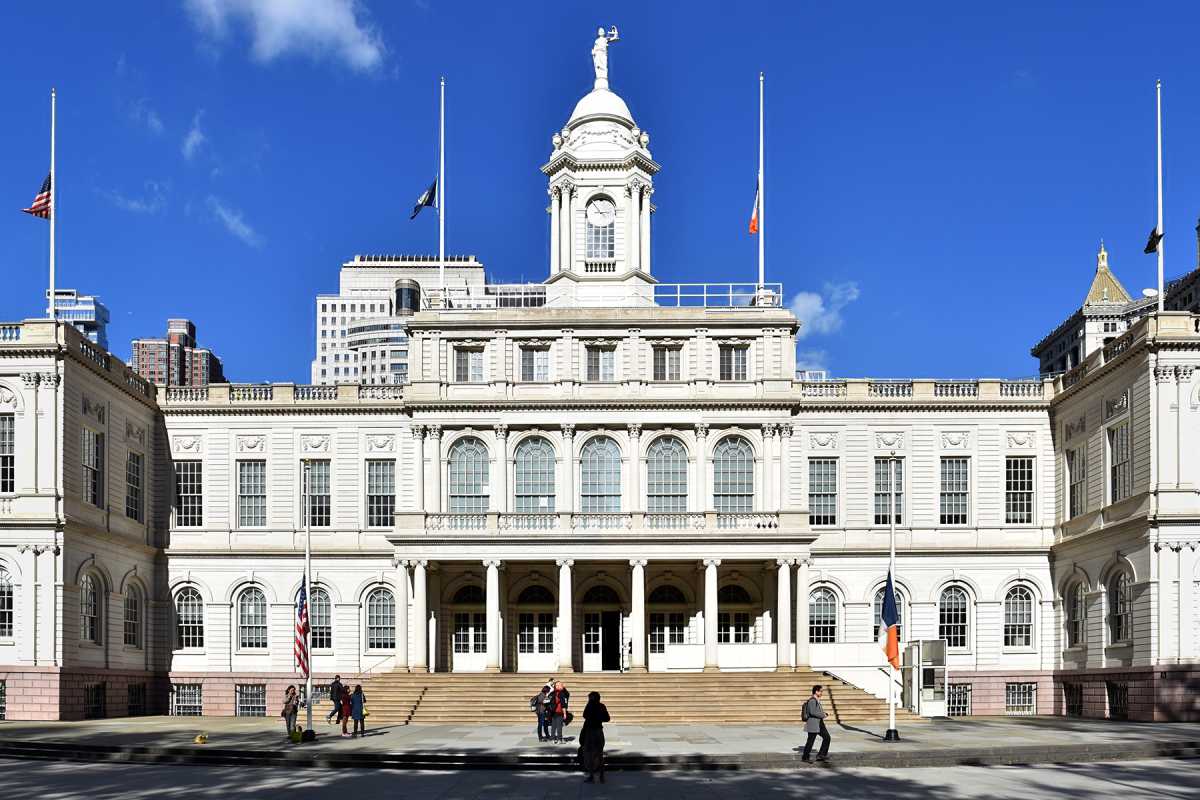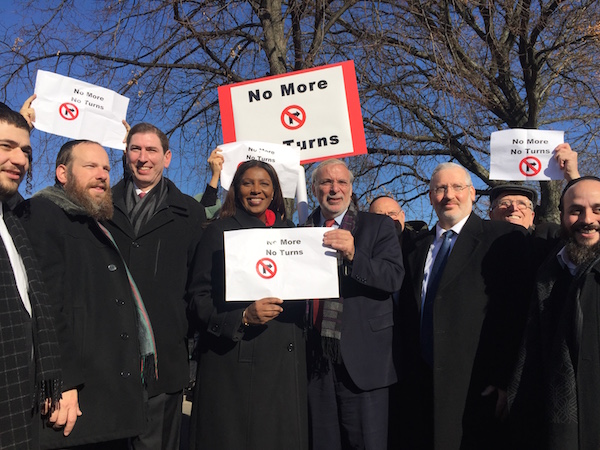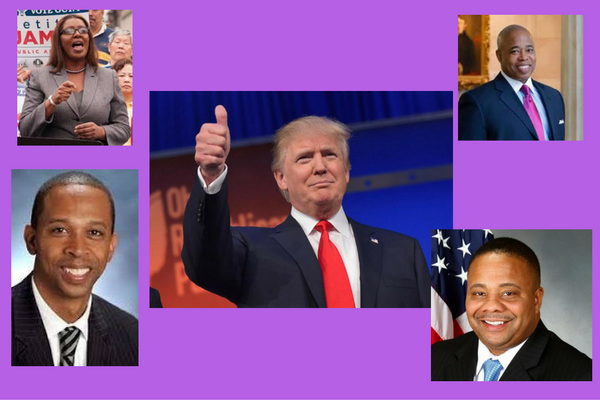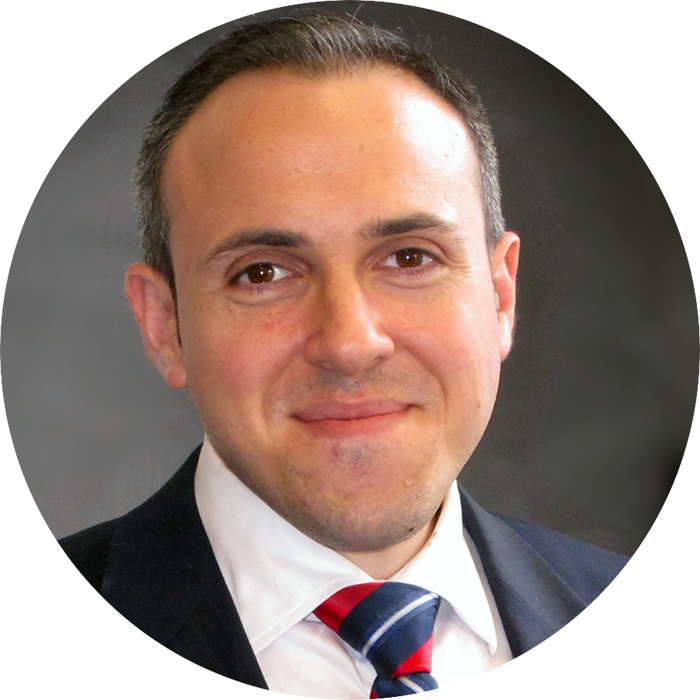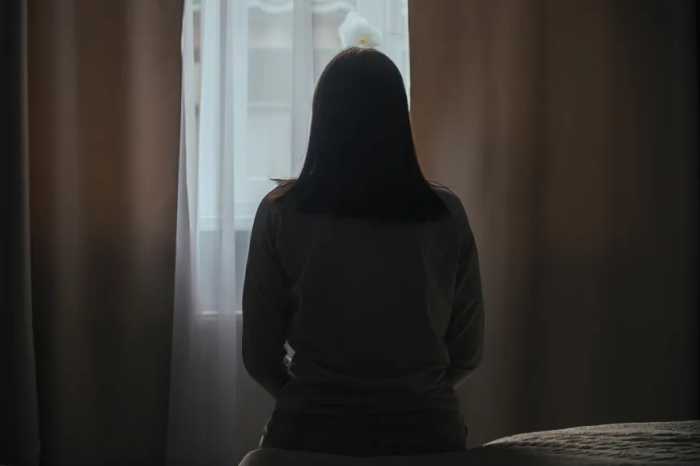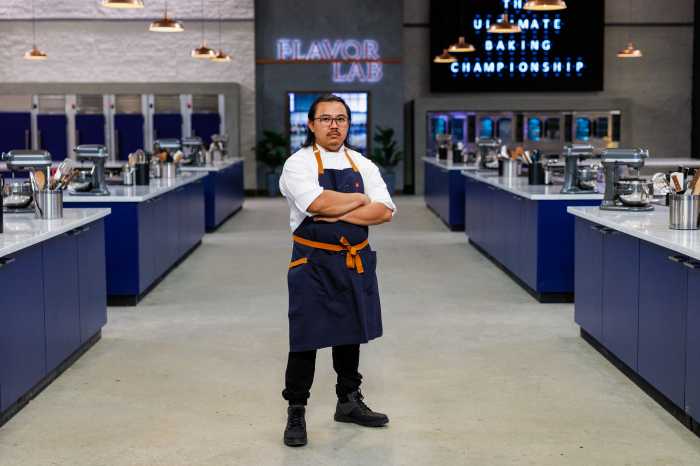The mayor of New York City, officially Mayor of the City of New York, is the head of the city’s executive branch: the “president” of the City, if you will. This office administers all city services, public property, law enforcement, fire protection, and most public agencies – all the things that your tax dollars pay for.
Who is running?
There are technically over 30 candidates running for Mayor this year, according to the latest campaign finance filings, so PoliticsNY made the executive decision to present the ones with the biggest followings and donations.
As such we reached out to, former presidential candidate Andrew Yang, Brooklyn Borough President Eric Adams, City Comptroller Scott Stringer, activists Maya D. Wiley and Dianne Morales, former Commissioner of the Department of Sanitation (DSNY) Kathryn Garcia, business mogul Ray McGuire, and former U.S Secretary of Housing and Urban Development (HUD) Shaun Donovan.
We sent all of them questions about what areas they’d primarily fund while in office, biggest challenges ahead, what they think of ranked choice voting, and changes to education.
Here’s what those who got back to us had to say:
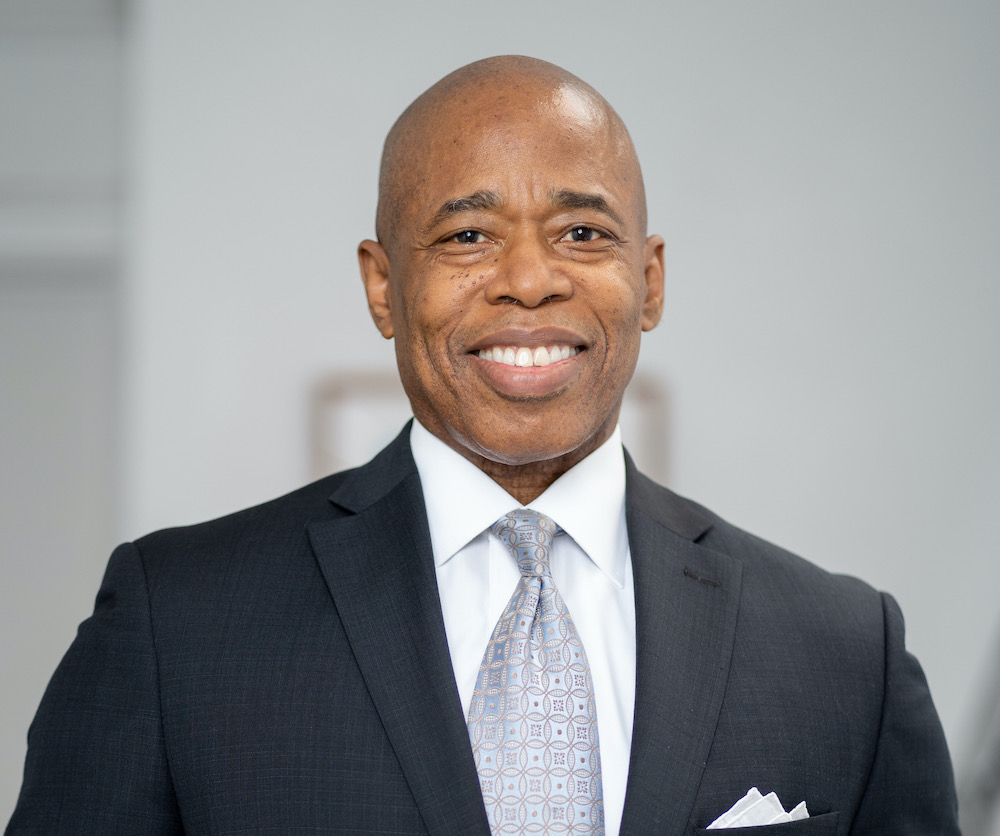
Eric Adams
What three areas would you prioritize funding to if elected?
Public Health- COVID-19 hit communities of color and low-income communities hardest because they did not have adequate healthcare before the pandemic. So I will open hundreds of healthcare centers in underserved communities.
Childcare- To lift up working families I will invest in a universal childcare program to offer free or subsidized child care to every parent who needs it.
Financial assistance- To help New Yorkers who are financially struggling, my NYC AID program will boost tax credits by up to 12-times the current amount in monthly payments. That means a family of four making $30,000 would get $3,000 extra.
What do you think will be the biggest challenge leftover from the de Blasio administration?
Our City is dysfunctional after generations of waste and inefficiency. It will be an enormous challenge to streamline our government and make it efficient–but we must, and it will be one of my top priorities. I will force our agencies to work together across one unified digital platform, saving taxpayers and our City money that can be reinvested in New Yorkers who are struggling, reducing inequality and improving the quality of life for all city residents. I will also create MyCity, a single portal for all City services that will help New Yorkers get the most out of their government.
How much of a factor will Ranked Choice Voting be in your campaign strategy?
I supported Ranked Choice Voting because it gives voters more options. Now we need to make sure New Yorkers are well-educated about it so that they can make use of those options and get the most out of their vote. First and foremost, my strategy is to simply tell my story to New Yorkers and share my ideas.
Do you think the Gifted & Talented (G&T) program and the Specialized High Schools Admissions Test (SHSAT) should be disbanded?
Many students are wrongly cast aside as low-aptitude because we are not evaluating the whole person. I will keep the SHSAT for our eight current schools–but I will also build five new specialized schools — one in each borough — and offer seats to the top students from the incoming classes of each middle school, guaranteeing those schools will be diverse. For other students, I would limit geographic preferences for school selection, and replace the current screening process with a pathway for every student to go to a middle school and high school that best suits their interest, ability and learning needs.
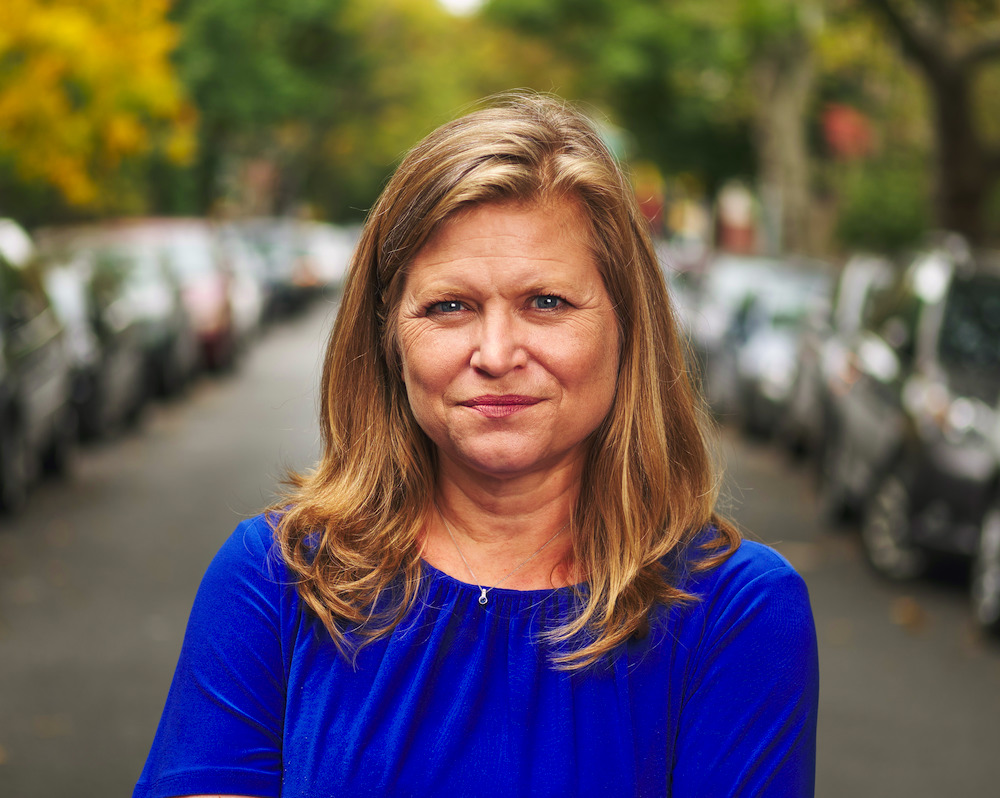
Kathyrn Garcia
What three areas would you prioritize funding to if elected?
My first priority will be on economic recovery and the affordability crisis. We need to get our small businesses back on their feet, get people back to work, and create more access to well-paying jobs. Recovery cannot happen without supporting our families. Women and caregivers had to drop out of the workforce at the highest rates during the pandemic. We need free childcare for kids ages 0-3 so families can have stability and upward mobility. We also need to ensure our city is safe and livable. We must tackle the rise in crime so that all New Yorkers feel safe to work, play, and live in our city.
What do you think will be the biggest challenge leftover from the de Blasio administration?
The next mayor will have to deal with multiple crises at once. We need leadership and focus.
We must tackle a dramatic rise in homelessness with compassion and urgency. All New Yorkers have a right to housing with dignity. My Housing that Heals plan will move our city from a shelter strategy to a permanent housing strategy.
We urgently need to close a five billion dollar budget gap to ensure our city stabilizes and controls its own destiny. We need to refinance our debt and find efficiencies within our government and cut needless bureaucracy.
How much of a factor will Ranked Choice Voting be in your campaign strategy?
Ranked choice has a lot of benefits, and often it can favor female and first-time candidates. However, I am running my campaign to reach all New Yorkers no matter where they are and make my case to be their number one pick this June. I have built an incredibly strong coalition across all five boroughs, and I plan to continue getting my message out to every New Yorker.
Do you think the Gifted & Talented (G&T) program and the Specialized High Schools Admissions Test (SHSAT) should be disbanded?
We can’t rely on a test for four-year-olds to determine their educational trajectory; high-stakes testing doesn’t accurately predict achievement. Instead, I will expand challenging enrichment opportunities — that means more gifted and talented programs at more schools and more entry points at every grade.
I also believe we need to incentivize better educational outcomes at every single middle school in the city. I would leave the SHSAT as is for now and focus on structural change to help integrate all of our classrooms. I will build new schools for students in the top 10% of their 8th-grade class.
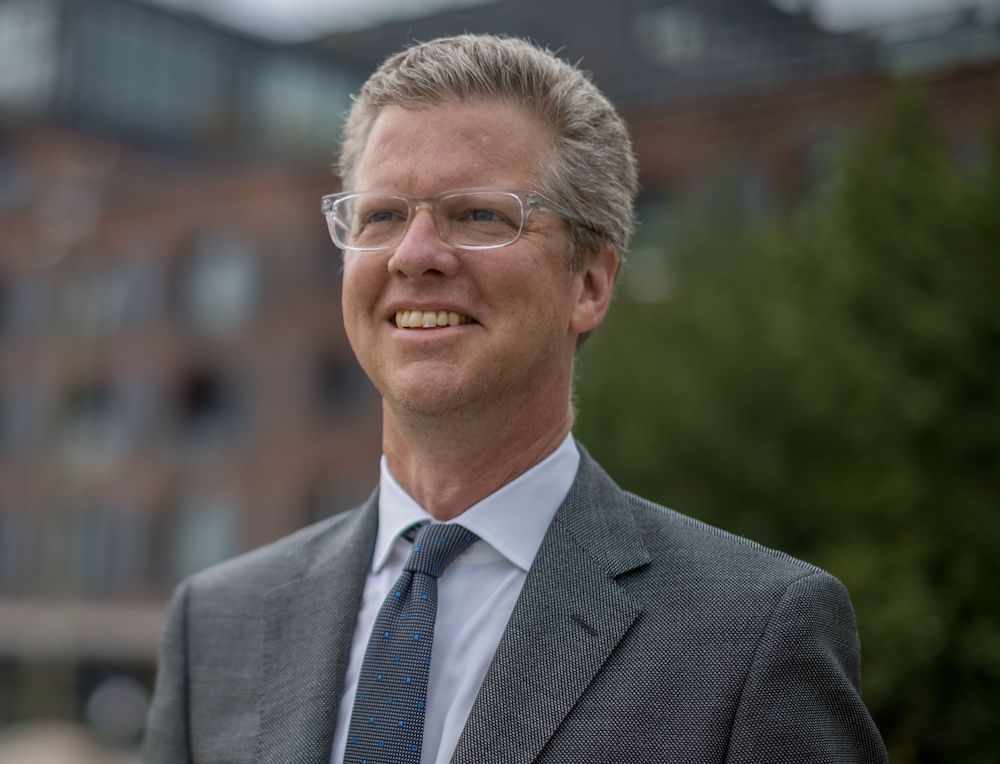
Shaun Donovan
What three areas would you prioritize funding to if elected?
Our children’s futures: I will immediately take action to implement my Equity Bonds proposal, which would provide $1,000 to every child in New York City, followed by up to an annual $2,000 for each year until they turn 18, with payments scaled based on family income. I would also work expeditiously to integrate our schools and make sure that all schools have the appropriate resources to ensure that every child, regardless of their zip code, is able to succeed.
Housing: I will adopt United for Housing’s call for $4 billion per year in capital funding for affordable housing production and preservation, increase annual spending on emergency rental assistance to $500 million, and increase the amount of arrears covered to $5,000 per household.
Health: A healthy NYC is a prosperous NYC. I will focus our vaccination efforts towards the communities that need them most and bring vaccines directly to the people who need them most by holding education and vaccination events at New York City Housing Authority (NYCHA) developments, naturally occurring retirement communities, and senior centers. I will also establish a three-tiered public option in New York City, prioritizing universal access to primary care and ensuring that every New Yorker, regardless of their immigration status, has access to quality health care.
What do you think will be the biggest challenge leftover from the de Blasio administration?
One of the biggest challenges will be rebuilding the trust between our city’s police and the communities that have been the victims of over-policing and an unjust criminal justice system. That’s why I am committing to reducing the role of police in our society and investing $500 million into community-focused public safety and racial justice initiatives, primarily by redirecting funds currently allocated to law enforcement and corrections, and dedicating roughly $3 billion or 20% of the city’s public safety budget for these efforts by the end of my first term.
How much of a factor will Ranked Choice Voting be in your campaign strategy?
Our strategy remains the same–engage with voters across our great city and let them know why I am the most experienced candidate, with the boldest and most comprehensive ideas, to lead our city out of this crisis.
NYC voters are hungry for change, but they are also hungry for a candidate with proven government experience. I am that candidate.
I am the only candidate in the race with bold progressive ideas, who also has the proven leadership experience of building consensus in order to make those big ideas a reality, and that is exactly the kind of candidate that will benefit from ranked-choice voting.
Do you think the Gifted & Talented (G&T) program and the Specialized High Schools Admissions Test (SHSAT) should be disbanded?
I support the Panel for Educational Policies’ recent move to stop using an exam for 4-year-olds as the sole entrance criteria for Gifted and Talented programming. Even the National Association for Gifted Children advises that assessments should never be used in isolation to identify gifted children.
As Mayor, I would get input from families and communities and experts to develop a new approach that is equitable, fair, and utilizes multiple, age-appropriate measures to determine entrance criteria. There are ideas from other districts that can inform a new approach, such as relative performance among peers in a given elementary school, teacher recommendations (with adequate training and auditing to ensure such recommendations are not biased), etc. And, I would put in checks to ensure new criteria and processes are not racially biased, using an equity audit that looks at the demographics of the students selected.
Additionally, I would move back the age at which students are identified for G&T. Identifying students for G&T at age 4 reflects parental income more than anything else.
My administration would fundamentally shift our notion of gifts and talents to be more inclusive, and create more classes in all districts for ALL students to participate in accelerated learning and enrichment activities (like those provided in current G&T programs).
Regarding the SHSAT, I would advocate to repeal Hecht-Calandra but would not wait for the state to address this issue, and would work with families and educators to change the entrance criteria for the five specialized high schools the city controls. The models developed in these five schools would help with the state advocacy to change the entrance criteria approach for the three controlled by the state law.
My comprehensive approach to addressing segregation in high schools includes: making permanent the current administration’s temporary elimination of geographic preferences in high schools, eliminating attendance and behavior screens in high schools and academic screens that have a discriminatory impact, and improving the high school admissions system so that entrance criteria are clear and transparent so families do not have to sift through a confusing hodgepodge of individualized rubrics for every high school they are interested in.
While there has been great emphasis on these specialized high schools, they represent just 8 of 400 public high schools; a comprehensive approach to improve our high schools must include addressing the drivers of segregation and improving student outcomes across all of our schools. Shaun would also aim to improve academic outcomes across NYC’s high schools, and better connect students to the workforce, through expanding early college high schools, and guaranteeing every high school student at least one paid, relevant internship, apprenticeship or job.
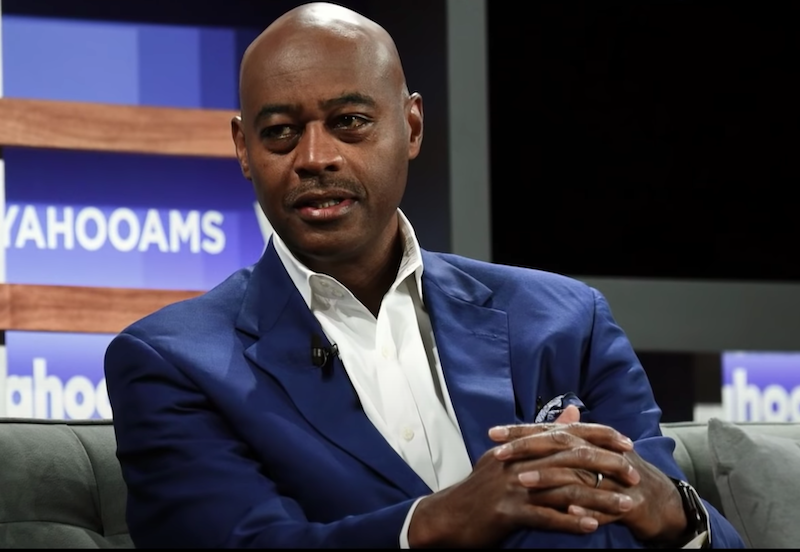
Ray McGuire
What three areas would you prioritize funding to if elected?
My top priority is a Comeback Plan to create 500,000 jobs through economic stimulus. That includes providing subsidies that would cover 50% of wages for small businesses to hire 50,000 New Yorkers; a major investment in our city’s infrastructure, and a Comeback Festival to get visitors back and spending money in NYC. No jobs, no city.
Number two, we need to fix our schools. I would use federal education aid to provide full day in person summer sessions and extend hours during the 2021-2022 school year to help kids catch up from the lost year. Going forward I’ll invest in high quality education for 0-3-year-olds through Affordable Childcare for All, and make sure every student knows how to read by 3rd grade.
Number three – we need to invest in core city services. I’d expand funding for trash pickup, parks, and fixing our streets.
What do you think will be the biggest challenge leftover from the de Blasio administration?
While the pandemic devastated our small businesses, many of them were already on the ropes because of years of neglect. These businesses account for half of all jobs in the city, and I will make NYC the best place in the world to start and run a small business.
How much of a factor will Ranked Choice Voting be in your campaign strategy?
My strategy is focused on communicating directly with voters about my vision to create jobs and lead the greatest and most inclusive comeback in NYC history.
Do you think the Gifted & Talented (G&T) program and the Specialized High Schools Admissions Test (SHSAT) should be disbanded?
I’ll increase the number of G&T classrooms, especially in under-represented districts. I would replace the current test with a multi-pronged admissions process designed by cognition experts to remove the current inequities in access and preparation. I will also create more seats for students entering 1st grade in 2022 to make sure those who are left out this year have another shot to qualify.
I would keep the SHSAT but expand admission criteria to include grades, recommendations, essays, and extracurricular activities. We also have to get students who want to go to these schools earlier and better opportunities to prepare – that includes the best tutoring, after-school programming, and access to extracurriculars.
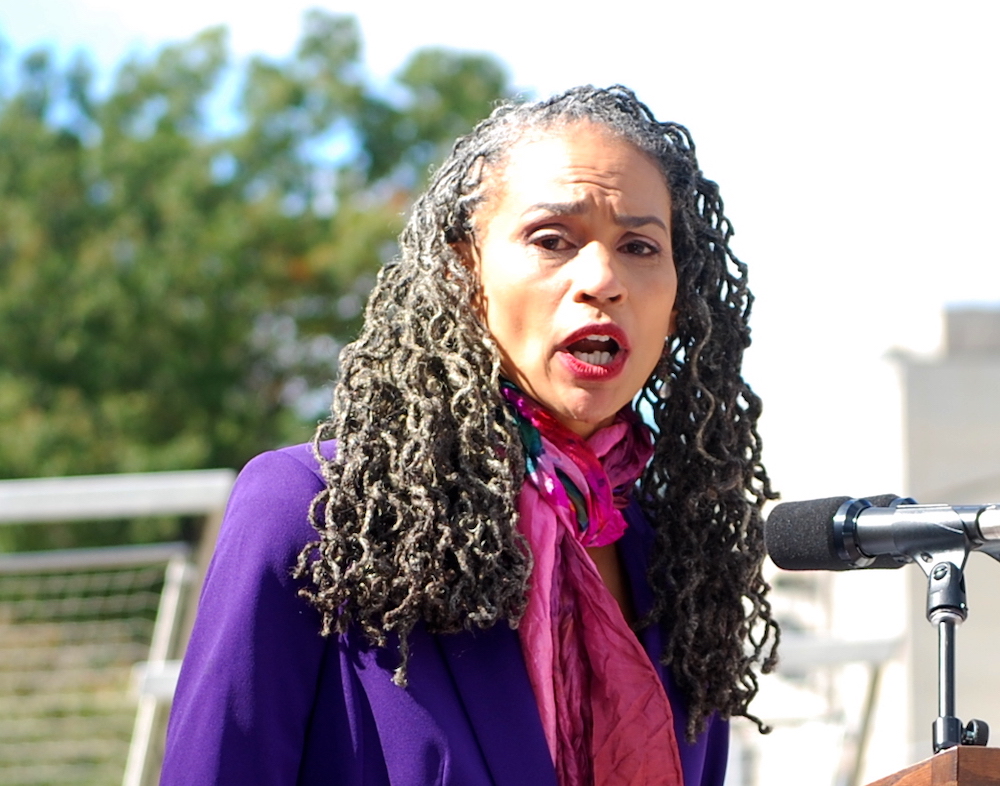
Maya Wiley
What three areas would you prioritize funding to if elected?
Jobs and Economy – my New Deal New York will invest $10 in our City’s economy and create 100,000 jobs to put our people back to work. Housing and Homelessness – homelessness is an eviction crisis and we need to ensure people can stay in their homes. Education – we have to get our children back in school and reform our education system so that kids have access to quality education no matter their zip code.
What do you think will be the biggest challenge leftover from the de Blasio administration?
The new Mayor is going to need to repair public trust in government – particularly when it comes to the NYPD and public safety. We need to put the Public back in Public Safety. This means a top to bottom restructuring of the NYPD, beginning with strong civilian oversight at the front end of policing — policies that make clear what policing is and is not, what conduct will not be tolerated, as well as the priorities of policing, which I describe as problem-oriented, rather than punitive.
How much of a factor will Ranked Choice Voting be in your campaign strategy?
Ranked Choice Voting has not changed how I am running my campaign. I am running to represent ALL New Yorkers. This is true whether or not there is Ranked Choice Voting. I do feel a responsibility as a candidate to help educate voters on the new system and am incorporating that education into my conversations with voters. Educating voters about the new system is also a core component of the work that my organizing and field team will be doing as we get closer to Primary day.
Do you think the Gifted & Talented (G&T) program and the Specialized High Schools Admissions Test (SHSAT) should be disbanded?
Yes. As Co-Chair of the School Diversity Advisory Group, I led a process with 40+ community leaders to present a series of proposals to tackle the structural inequalities and racism that exist in our school system. These proposals included ending racist admissions testing. I would start with those tests and processes that are within the control of the city and do not rely on the State legislature.
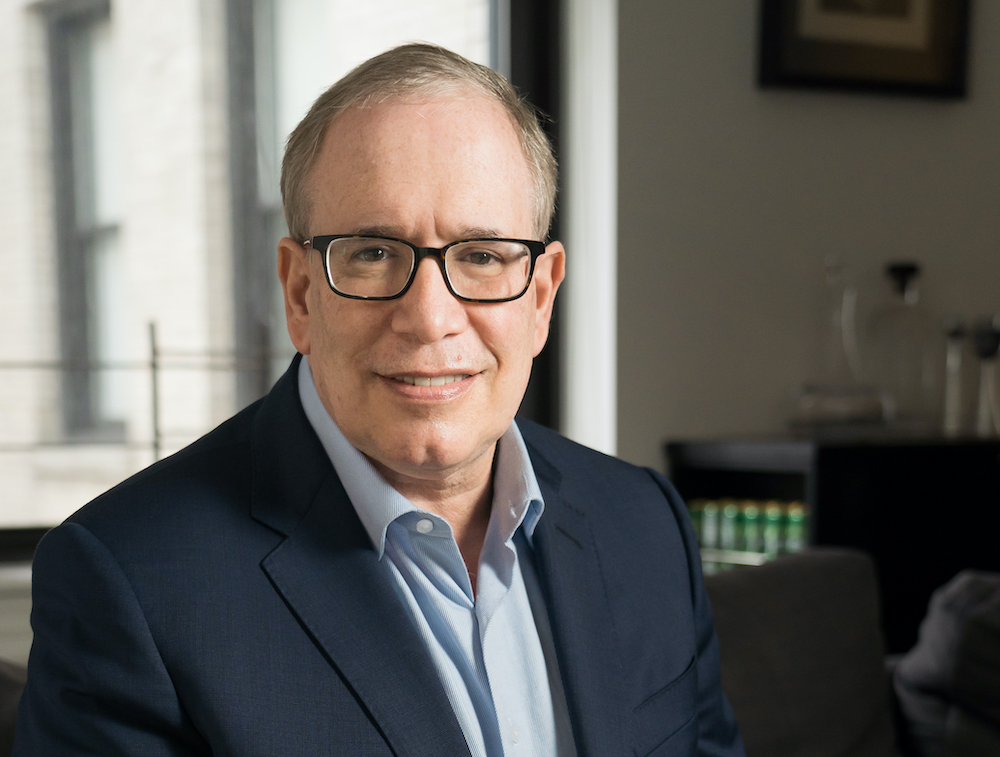
Scott Stringer
What three areas would you prioritize funding to if elected?
As mayor, I will make significant, much-needed investments to make housing more affordable in this city, offer accessible high-quality child care to working families, and combat the climate crisis and build a more sustainable city for my kids and the next generation of New Yorkers. I have a bold progressive vision with the skills and experience to make it a reality and build a stronger and fairer city.
What do you think will be the biggest challenge leftover from the de Blasio administration?
The next mayor is going to have to lead New York City’s recovery from the COVID-19 crisis and not just jumpstart our economy but also rebuild a true five-borough economy that serves all New Yorkers. We can’t reopen this city the same way we closed it – we need to reimagine our economy so it’s fairer for working people. That means finally taking on our affordability crisis and making housing, child care, community college, and so many more core city services accessible to every New Yorker that needs them.
How much of a factor will Ranked Choice Voting be in your campaign strategy?
Ranked-Choice Voting is a groundbreaking reform that will breathe new life into our democracy. It has raised the level of discourse in this campaign – any person that wants to be mayor will have to talk to New Yorkers in all corners of the city and build a broad coalition to win this race. That’s exactly what I’m doing every day, and I’ll continue doing it all the way through Election Day.
Do you think the Gifted & Talented (G&T) program and the Specialized High Schools Admissions Test (SHSAT) should be disbanded?
Our specialized high school admissions process is broken, and we need to fix it. I will eliminate the SHSAT and shift to the 7th-grade state tests, which all kids take and which actually tests what is taught in the classroom.
Testing four-year-olds for G&T is absurd, and it needs to stop. The system is not fair, and it’s not working for everyone. We should either start G&T in later grades or replace the enrollment process with a more holistic approach – or both. Most importantly, we need equitable access to G&T, which we do not have now.
Andrew Yang’s campaign declined to provide answers to the q & a.
Dianne Morales hasn’t returned the q & a.


